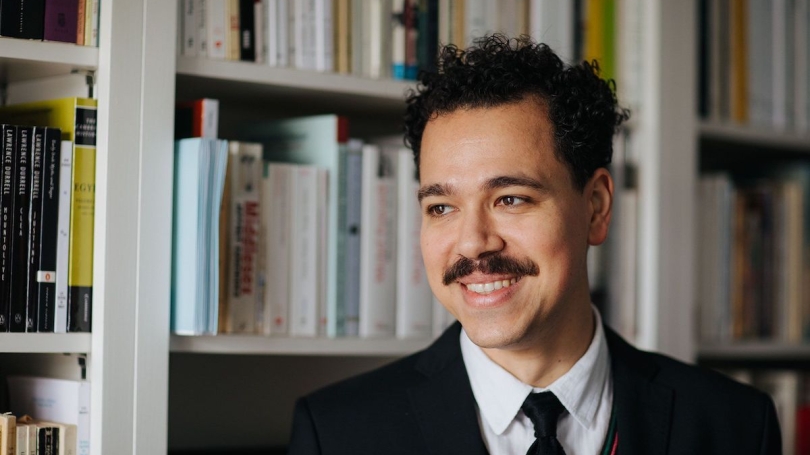
- Undergraduate
- Graduate
- Performance
- Foreign Study
- News & Events
- People
Back to Top Nav
Back to Top Nav
Back to Top Nav
Back to Top Nav
Back to Top Nav
Back to Top Nav
Scholars from around the world will convene at Dartmouth Nov. 10 and 11 to explore literary texts through the framework of sound—working across traditions, histories, and languages to reconnect with literature's oral and aural origins.
A pianist and guitar player in his youth, French literature scholar yasser elhariry found his way back to music through sound studies—an emerging interdisciplinary field that examines sounds in historical and cultural contexts.
It was R. Murray Schafer's seminal 1977 book, The Tuning of the World (The Soundscape), that coined the word "soundscape"—and piqued elhariry's interest when he was in graduate school.
"Since I don't play music anymore, I think I modulated my musical interests into this emerging field," says elhariry, an associate professor in the Department of French and Italian.
His most recent edited volume of scholarly essays examines Francophone colonial and postcolonial soundscapes—the auditory experiences of French-speaking people outside France.
"What did Algiers sound like in the 1950s, leading up to its liberation in 1962? What did people sound like? What music were they playing? What does a bar in Algiers in a poor neighborhood sound like?" elhariry asks. "In refocusing from the visual and textual to the oral and aural, we're shifting our analyses from a landscape—what things look like—to a soundscape."
While early work in sound studies emphasized the development of sound reproduction technologies, elhariry and fellow scholars in the humanities increasingly apply the framework of sound to cultural experiences and literary texts from a range of temporal and national contexts.
Next Thursday, Nov. 10, and Friday, Nov. 11, scholars from around the world will convene at Dartmouth for "Literature as Sound Studies," a conference elhariry organized with fellow French scholar Liesl Yamaguchi of Boston College, with support from the Department of French and Italian and Leslie Center for the Humanities. Rather than focus on a single literary tradition or historical period, the conference takes a sweeping and broad approach, with presenters including experts in French literature, German, Japanese, English, translation studies, classics, and poetry.
With the earliest literary texts authored with the expectation that they would be heard, not read—such as lyric poetry sung by troubadours in the Middle Ages—elhariry views the study of sound and literature as a natural fit.
"Approaching literature through sound allows us to reconnect with its origins," he says.
Looking back at the emergence of sound studies, elhariry sees an opportunity to "make an intervention."
"Literature has had no place in sound studies over the past 20 years," he explains. "We're trying to fill this literary gap and explore how literature has always been a way of encoding sound—and to make this exploration an integral part of sound studies."
An 'Important Intellectual Investment'
"Literature as Sound Studies" will be the third international conference that elhariry has led at Dartmouth.
In 2016 he convened a group of scholars to explore how the Mediterranean in the modern period generated ideologies, and in 2019 he led the first major conference in the United States on Moroccan literary critic and writer Abdelkébir Khatibi. Both conferences ultimately led to publications—an edited volume and a special feature in PMLA, respectively.
elhariry and Yamaguchi plan to co-edit a publication based on this year's conference as well.
"My idea of a conference is that it's a kind of utopia where new ideas can emerge and where people are comfortable and relaxed and can think creatively together," elhariry says. "In addition to teaching at Dartmouth, these kinds of intellectual investments are the most important things we do as scholars."
Scott Sanders, a fellow professor in the Department of French and Italian, looks forward to presenting a paper at the conference titled "Literary Physics: Experiments with Sound." Like elhariry, he found his way to sound studies through his own love of music.
"I trained as an opera singer and also studied French literature in college," Sanders says. "Ever since, I have tried to find ways to marry my passions for literature and music. By presenting my work at this conference, I hope to contribute to a broader discussion about how 17th and 18th-century physicists conceptualized the movement of sound."
In his research Sanders discovered "a conspicuous literary presence" in early modern experiments with sound. "Some authors used the common metaphor of sound waves, but some described sound as sonic rays and fibers," he says. "So the literary often provided physicists tools with which to measure, evaluate, and conceptualize sonic objects."
The conference will conclude with a bilingual poetry reading at Hanover's Still North Books and Bar featuring poet Ryoko Sekiguchi and translation studies scholar and poet Lindsay Turner.
"We're trying to move beyond the academic campus setting with events that complement the papers that will be presented," elhariry says.
He hopes the event will interest the broader public as well as his former students, who know Sekiguchi's work through elhariry's comparative literature class, which highlights the literary tradition of poets translating poets. "I know that some of them are already very excited to meet Ryoko."
From the initial proposals to event logistics, each conference elhariry has led at Dartmouth has been a multiyear undertaking. He remains grateful for the institutional support that makes them possible.
"It's really cool that we have the resources to host this sort of international gathering in rural New England."